6各种从句的翻译
- 格式:ppt
- 大小:300.00 KB
- 文档页数:58
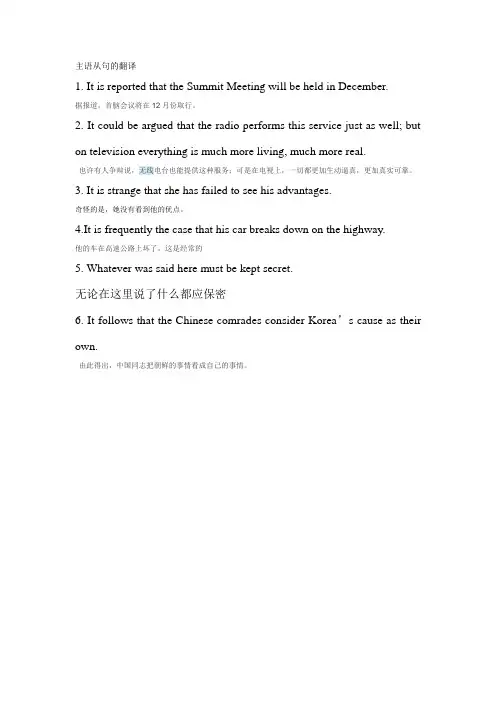
主语从句的翻译
1. It is reported that the Summit Meeting will be held in December.
据报道,首脑会议将在12月份取行。
2. It could be argued that the radio performs this service just as well; but on television everything is much more living, much more real.
也许有人争辩说,无线电台也能提供这种服务;可是在电视上,一切都更加生动逼真,更加真实可靠。
3. It is strange that she has failed to see his advantages.
奇怪的是,她没有看到他的优点。
4.It is frequently the case that his car breaks down on the highway.
他的车在高速公路上坏了,这是经常的
5. Whatever was said here must be kept secret.
无论在这里说了什么都应保密
6. It follows that the Chinese comrades consider Korea’s cause as their own.
由此得出,中国同志把朝鲜的事情看成自己的事情。
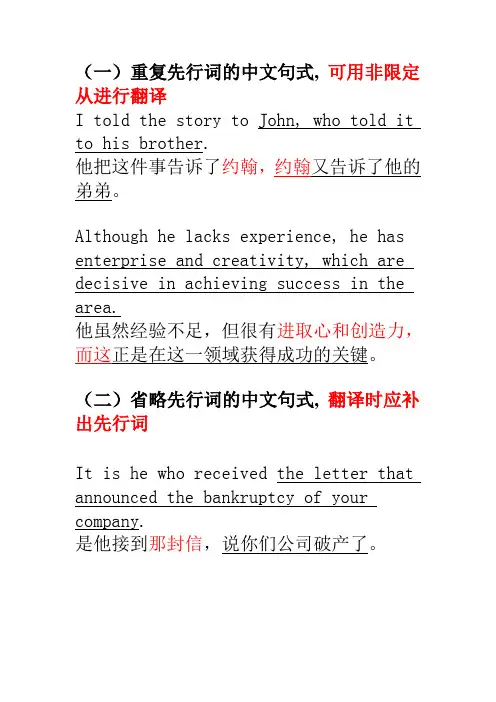
(一)重复先行词的中文句式, 可用非限定从进行翻译I told the story to John, who told it to his brother.他把这件事告诉了约翰,约翰又告诉了他的弟弟。
Although he lacks experience, he has enterprise and creativity, which are decisive in achieving success in the area.他虽然经验不足,但很有进取心和创造力,而这正是在这一领域获得成功的关键。
(二)省略先行词的中文句式,翻译时应补出先行词It is he who received the letter that announced the bankruptcy of your company.是他接到那封信,说你们公司破产了。
They worked out a new method by which production has now been rapidly increased.他们制定出一种新方案,采用之后生产已迅速得到提高。
(三)某些状语译成定语从句(一)译成表示“时间”的分句A driver who is driving the bus mustn’t talk with others or be absent-minded.司机在开车时,不许和人谈话,也不能走神。
(二)译成表示“原因”的分句He doesn’t want to talk with Mrs. Smith, who is very haughty and conceited now他不愿和史密斯太太讲话,因为她现在非常傲慢和自负。
(三)译成表示“条件”的分句Men become desperate for any kind of work, which will help them to keep alive their families.人们极其迫切地要求工作,不管什么工作,只要它能维持一家人的生活就行。
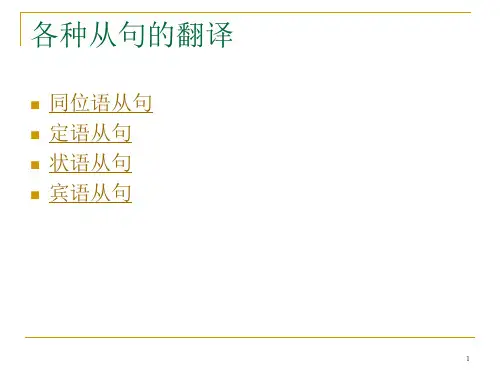
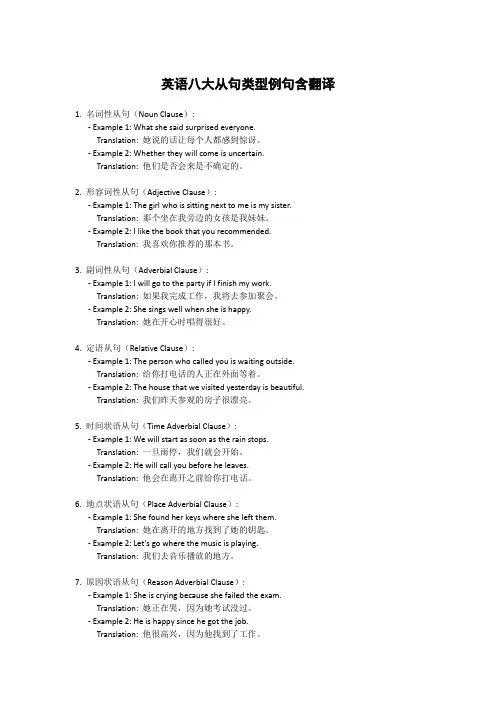
英语八大从句类型例句含翻译1. 名词性从句(Noun Clause):- Example 1: What she said surprised everyone.Translation: 她说的话让每个人都感到惊讶。
- Example 2: Whether they will come is uncertain.Translation: 他们是否会来是不确定的。
2. 形容词性从句(Adjective Clause):- Example 1: The girl who is sitting next to me is my sister.Translation: 那个坐在我旁边的女孩是我妹妹。
- Example 2: I like the book that you recommended.Translation: 我喜欢你推荐的那本书。
3. 副词性从句(Adverbial Clause):- Example 1: I will go to the party if I finish my work.Translation: 如果我完成工作,我将去参加聚会。
- Example 2: She sings well when she is happy.Translation: 她在开心时唱得很好。
4. 定语从句(Relative Clause):- Example 1: The person who called you is waiting outside.Translation: 给你打电话的人正在外面等着。
- Example 2: The house that we visited yesterday is beautiful.Translation: 我们昨天参观的房子很漂亮。
5. 时间状语从句(Time Adverbial Clause):- Example 1: We will start as soon as the rain stops.Translation: 一旦雨停,我们就会开始。
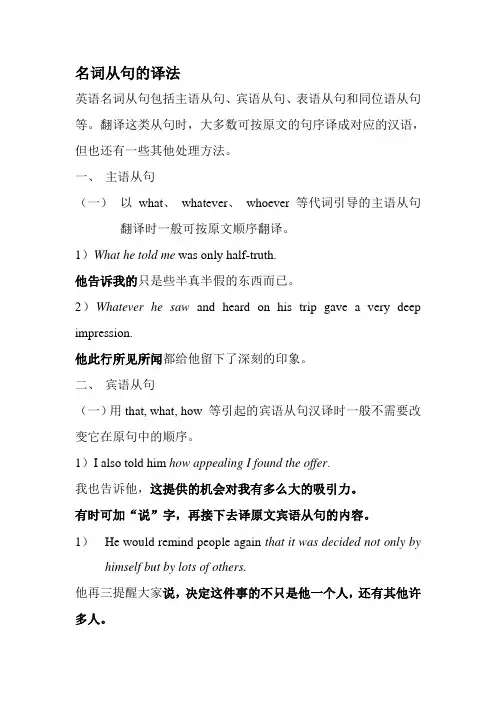
名词从句的译法英语名词从句包括主语从句、宾语从句、表语从句和同位语从句等。
翻译这类从句时,大多数可按原文的句序译成对应的汉语,但也还有一些其他处理方法。
一、主语从句(一)以what、whatever、whoever 等代词引导的主语从句翻译时一般可按原文顺序翻译。
1)What he told me was only half-truth.他告诉我的只是些半真半假的东西而已。
2)Whatever he saw and heard on his trip gave a very deep impression.他此行所见所闻都给他留下了深刻的印象。
二、宾语从句(一)用that, what, how 等引起的宾语从句汉译时一般不需要改变它在原句中的顺序。
1)I also told him how appealing I found the offer.我也告诉他,这提供的机会对我有多么大的吸引力。
有时可加“说”字,再接下去译原文宾语从句的内容。
1)He would remind people again that it was decided not only by himself but by lots of others.他再三提醒大家说,决定这件事的不只是他一个人,还有其他许多人。
三、表语从句英语表语从句和宾语从句一样,一般可按原文顺序翻译。
1)What he emphasized over and over again was that no matter how difficult it might be, they should never retreat even for an inch.他所再三强调的是,不管多么困难,他们决不应该后退寸步。
2) That was how a small nation won the victory over a big power.就这样,小国战胜了大国。
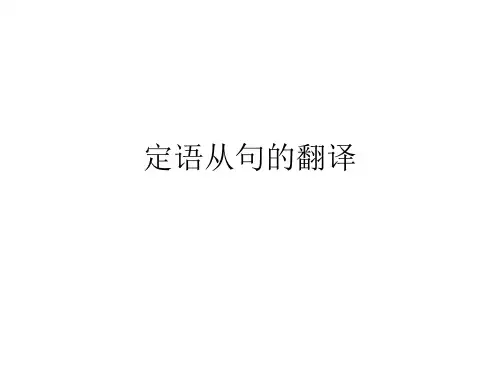
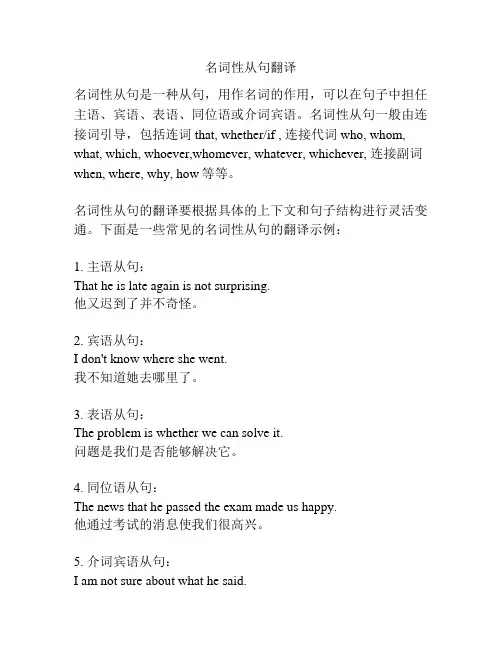
名词性从句翻译名词性从句是一种从句,用作名词的作用,可以在句子中担任主语、宾语、表语、同位语或介词宾语。
名词性从句一般由连接词引导,包括连词that, whether/if , 连接代词who, whom, what, which, whoever,whomever, whatever, whichever, 连接副词when, where, why, how等等。
名词性从句的翻译要根据具体的上下文和句子结构进行灵活变通。
下面是一些常见的名词性从句的翻译示例:1. 主语从句:That he is late again is not surprising.他又迟到了并不奇怪。
2. 宾语从句:I don't know where she went.我不知道她去哪里了。
3. 表语从句:The problem is whether we can solve it.问题是我们是否能够解决它。
4. 同位语从句:The news that he passed the exam made us happy.他通过考试的消息使我们很高兴。
5. 介词宾语从句:I am not sure about what he said.我不确定他说的是什么。
6. 间接引导名词性从句:He asked where I lived.他问我住在哪里。
7. 是否从句:I wonder whether/if she will come to the party.我想知道她是否会来参加派对。
8. 选择性从句:He asked me whether I preferred coffee or tea.他问我是喜欢咖啡还是茶。
9. 宾语从句(陈述句变为疑问句):Do you know what time it is?你知道现在几点钟吗?10. 宾语从句(连接代词):I wonder who is going to pick us up at the airport.我想知道谁会在机场接我们。
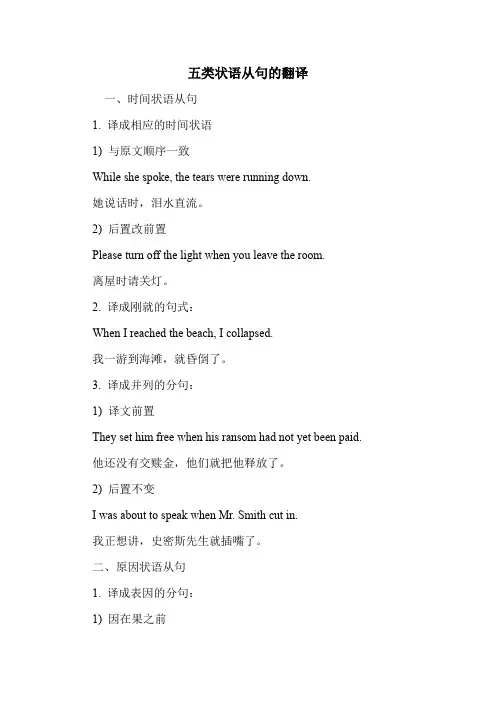
五类状语从句的翻译一、时间状语从句1. 译成相应的时间状语1) 与原文顺序一致While she spoke, the tears were running down.她说话时,泪水直流。
2) 后置改前置Please turn off the light when you leave the room.离屋时请关灯。
2. 译成刚就的句式:When I reached the beach, I collapsed.我一游到海滩,就昏倒了。
3. 译成并列的分句:1) 译文前置They set him free when his ransom had not yet been paid. 他还没有交赎金,他们就把他释放了。
2) 后置不变I was about to speak when Mr. Smith cut in.我正想讲,史密斯先生就插嘴了。
二、原因状语从句1. 译成表因的分句:1) 因在果之前The crops failed because the season was dry.因为气候干旱,作物歉收。
2) 果在因之前She could get away with anything, because she looked such a baby.她能渡过任何风险,因为她看上去简直还像娃娃模样。
2. 译成因果偏正复句中的主句:Pure iron is not used in industry because it is too soft.纯铁太软,所以不用在工业上。
Because he was convinced of the accuracy of this fact, he stuck to his opinion.他深信这件事正确可靠,因此坚持己见。
3. 译成无关联词的因果关系并列分句:Where there is sound, there must be sound waves.哪里有声音,哪里就必有声波。
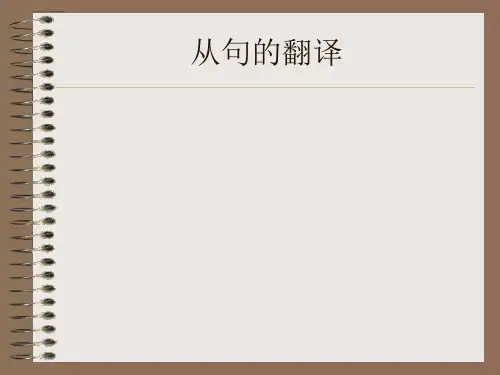

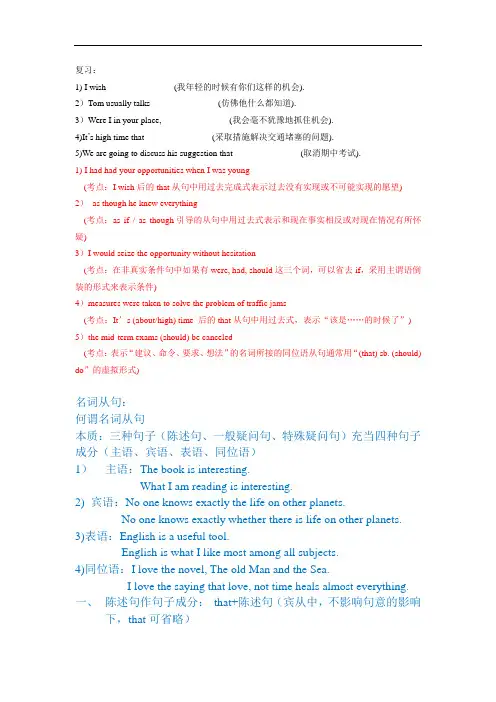
复习:1) I wish _______________(我年轻的时候有你们这样的机会).2)Tom usually talks _______________(仿佛他什么都知道).3)Were I in your place, _______________(我会毫不犹豫地抓住机会).4)It’s high time that _______________(采取措施解决交通堵塞的问题).5)We are going to discuss his suggestion that _______________(取消期中考试).1) I had had your opportunities when I was young(考点:I wish后的that从句中用过去完成式表示过去没有实现或不可能实现的愿望)2)as though he knew everything(考点:as if / as though引导的从句中用过去式表示和现在事实相反或对现在情况有所怀疑)3)I would seize the opportunity without hesitation(考点:在非真实条件句中如果有were, had, should这三个词,可以省去if,采用主谓语倒装的形式来表示条件)4)measures were taken to solve the problem of traffic jams(考点:It’s (about/high) time 后的that从句中用过去式,表示“该是……的时候了”) 5)the mid-term exams (should) be canceled(考点:表示“建议、命令、要求、想法”的名词所接的同位语从句通常用“(that) sb. (should) do”的虚拟形式)名词从句:何谓名词从句本质:三种句子(陈述句、一般疑问句、特殊疑问句)充当四种句子成分(主语、宾语、表语、同位语)1)主语:The book is interesting.What I am reading is interesting.2) 宾语:No one knows exactly the life on other planets.No one knows exactly whether there is life on other planets. 3)表语:English is a useful tool.English is what I like most among all subjects.4)同位语:I love the novel, The old Man and the Sea.I love the saying that love, not time heals almost everything.一、陈述句作句子成分:that+陈述句(宾从中,不影响句意的影响下,that可省略)1)English is important.That English is important is an undoubted fact.2)Love , not time heals all wounds.I’ve learned that love, not time heals all wounds.3)The child should be sent to school.My idea is that the child should be sent to school.4)He succeeded in the experiment.The fact that he succeeded in the experiment pleased everybody.为什么用that?that 相当于“指路牌”,能帮我们指明断句的方向,不造成对句子的误解。
桂林旅游高等专科学校教案第十六讲从句翻译Lecture 16 Clauses一、名词从句的译法(Noun Clause)(一)主语从句(Subject Clause)(引导词that, what, whether, who, when, where, why, how, which, whose, whatever…)(先译主句还是先译从句?whatever等引导的,先译从句;it作形式主语的,视情况而定)1.It is strange that we should meet here.我们能在这里见面,这真是想不到。
(逆译法:先译从句,后译主句)2. It is essential that every child should have the same opportunity to have education.每个儿童都应当有同样的受教育的机会,这一点是非常重要的。
(逆译法:先译从句,后译主句)3. It is a common misconception that English is extraordinarily difficult for foreigners to learn.英语对外国人来说特别难学,这是一种普遍的误解。
(逆译法:先译从句,后译主句)4. It is a matter of common experience that bodies are lighter in water than they are in air.物体在水中比在空气中轻,这是一种大家共有的经验。
(逆译法:先译从句,后译主句)5. It's really a mystery why all our attempts have been unsuccessful.为什么我们的一切尝试都失败了,这真是个谜。
(逆译法:先译从句,后译主句)6.It is a truth universally acknowledged that a single man in possession of a good fortune must be in want of a wife. (An abstract from Pride and Prejudice, by Jane Austen)a)凡是有钱的单身汉,总想娶位太太,这已经成了一条公认的真理。
状语从句翻译1 她说话时,泪水直流(while)1.Tearswas runnin g down her face whileshe talked.2 我正在吃饭的时候,她进来了。
(when)2.She came in when i was dinnin g.3 他结束讲话的时候,听众掌声雷动。
(as)3.The audien ce gave a roundof applau se as he endedhis speech.4 他将得到提升,因为他工作干得好(for)4.He will get promot ed for his hard workin g.5 理论之所以有价值,是因为它能给实践指出方向(becaus e)5.Theory has valuebecaus e it indica tes the direct ion for practi ce.6 为了正午以前赶到那里,我们很早就动身了(so that)6.We set out so earlythat we couldreachtherebefore the noon.7 如果没有他们的批准,我们不能开始这项工作。
(until)7.We can't get into the work untilthey approv e.1.他对她一见钟情。
了解越多,爱得越多。
1.He fell in love with her at the firstsight.The more he knowsher, the more he lovesher.2.虽然我很累,但因为做了一件好事而深感高兴。
2.Even though I am tired, but I am happybecaus e I did a good deed.3.违法的人都将受到惩罚。